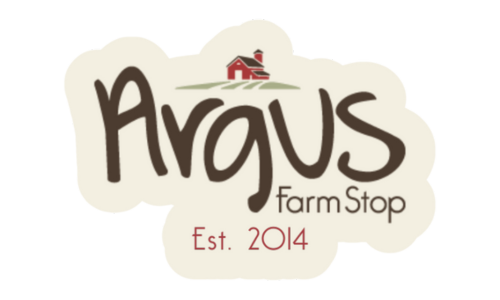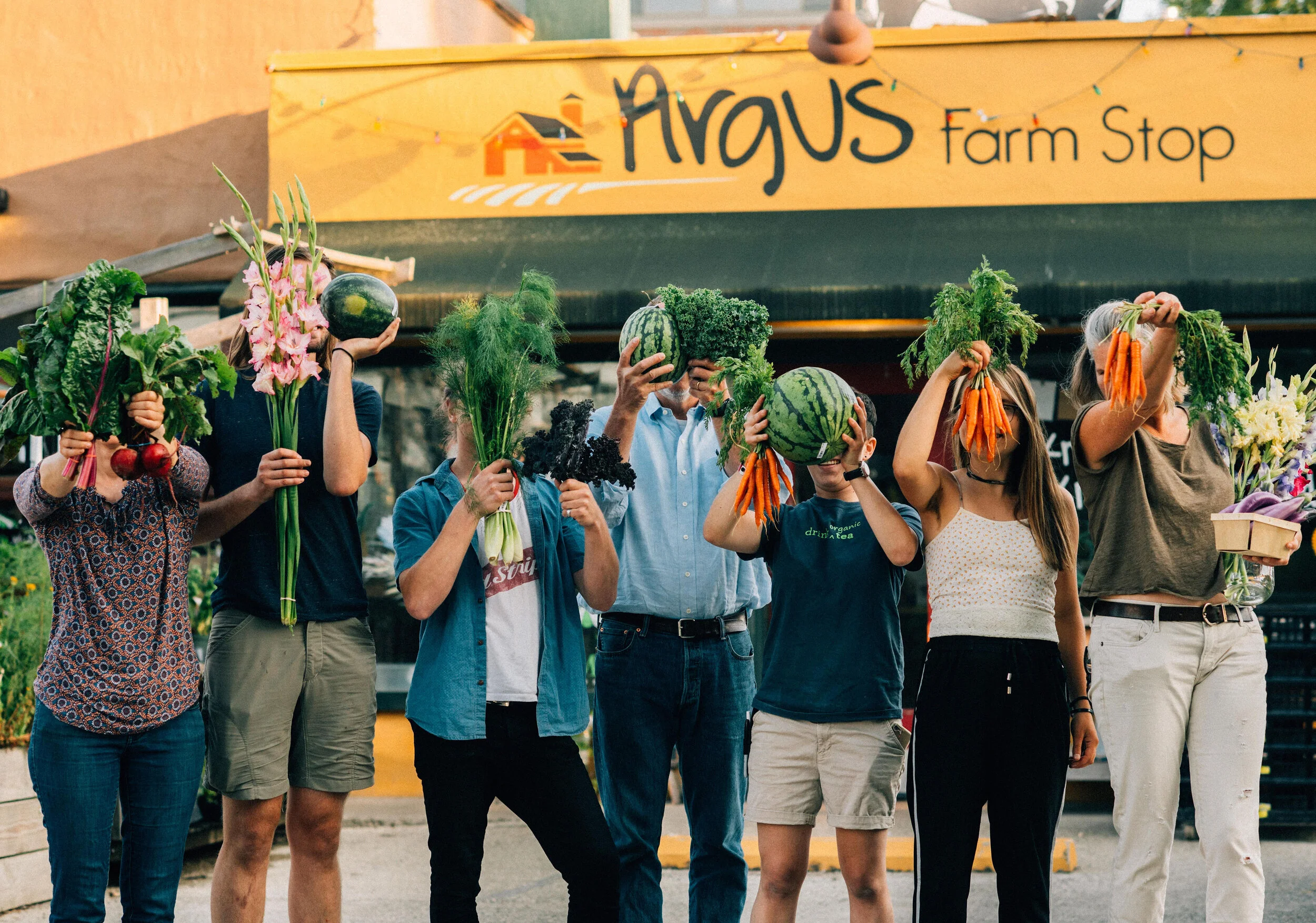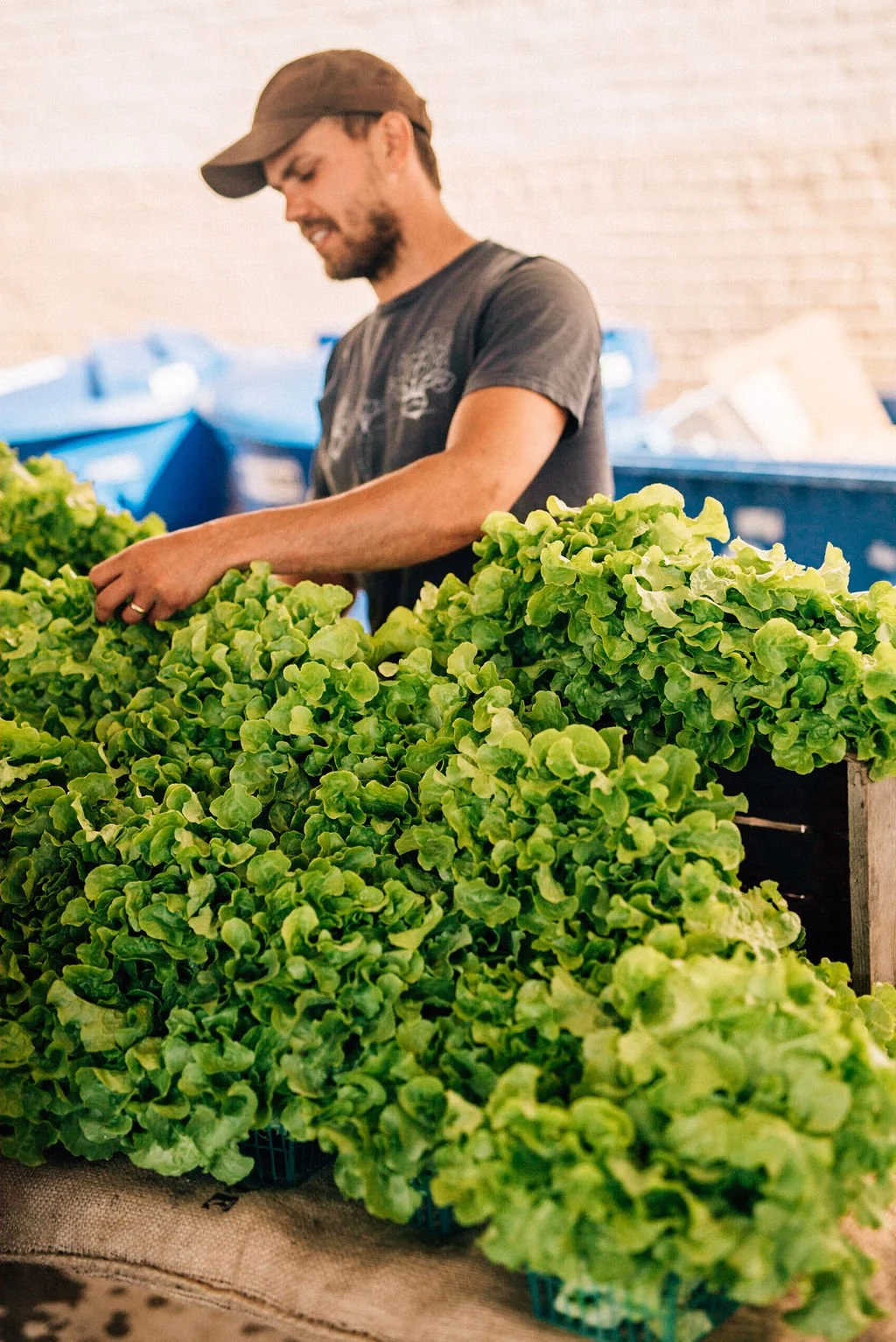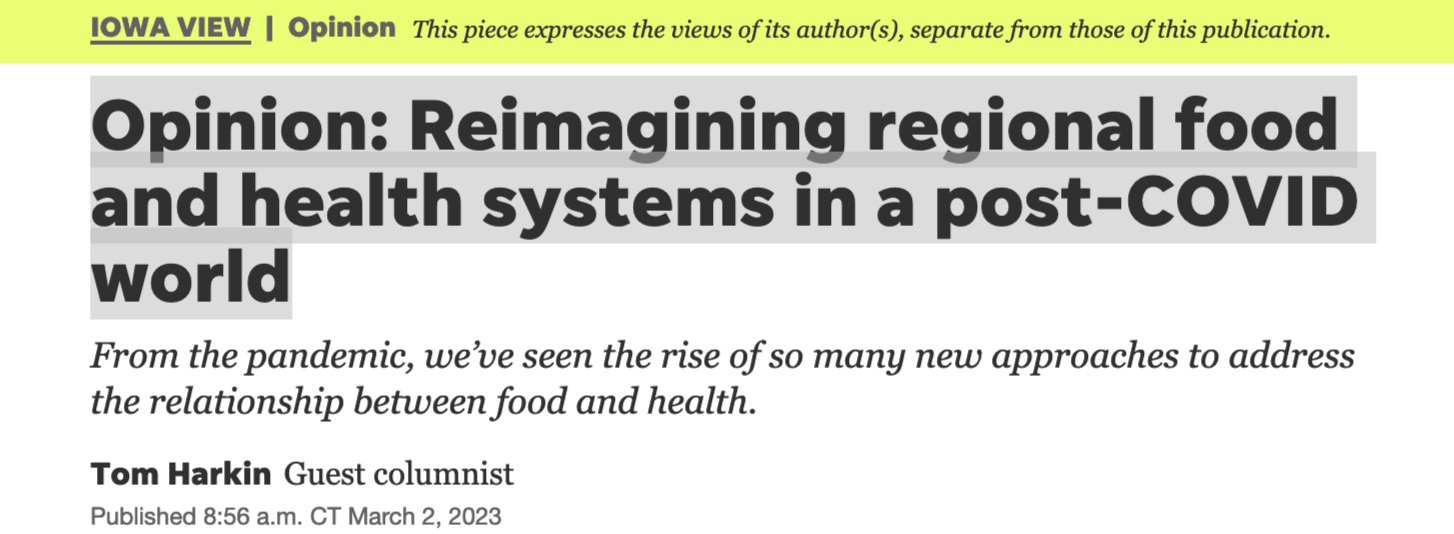
Our Mission
Our mission is to grow our local agricultural economy. How?
We want small, local farms to succeed. We provide a place where local farms can sell locally-grown produce and other goods conveniently to consumers, year-round!
What is a Farm Stop?
We coined the farm stop name as a way to describe what happens at Argus Farm Stop. We are neither a traditional farmers market nor a traditional grocery store, but rather an intersection that takes the best features of both.
The farm stop name indicates that the store can be a brief stop in the busy days of our farms and our customers. Farmers always get free beverages when they visit the market and they often stop and pause for a bit of conversation and community. Importantly, they can then leave and return to the farm and our staff will step in to represent the farm in selling that farm's products. Customers can make a quick visit to shop for all their food needs at Argus Farm Stop and can also pause and chat with farmers in the store or our staff.
The farm stop name is descriptive of the community that is being built at Argus Farm Stop and similar stores across the country.
"Our future is local" is more than just a tag line for us. We live it.
When you shop here, you are shopping directly from local farms and producers.
Why Buy Your Food From Local Producers?
Why wouldn't you prefer something grown nearby to something shipped from a thousand miles away - or another country? When local farms have a dependable place to sell their produce, they will grow wonderful produce! We sell produce, meats, dairy, and artisanal goods for over 200 producers!
Fresher and better quality
Food grown locally is fresher than food shipped from a distance. The farmers who sell at Argus Farm Stop grow on small farms generally from 5-50 miles from our market. Some are certified organic, some use "beyond organic" practices, and NONE are "conventional" farmers*. Our farms grow sustainably, using methods like crop rotation, and IPM (integrated pest management). They raise their meats and poultry using practices that are humane and healthy. The eggs here are from hens who really do roam free.
Our produce is often picked the morning that it is delivered. Customers tell us frequently that they notice the difference. And our farmers actively help us make sure we display and store their produce to their high standards. Their name is on the produce and they care about how it is maintained.
Our staff can tell you specifically about the farms your purchases come from, and answer questions you may have.
*Conventional farming refers to a method of farming in which the use of GMO's, chemical pesticides/herbicides and chemical fertilizers is allowed.
Better for the environment
Buying local food means that we use fewer fossil fuels in transportation. Sustainable farming methods use fewer chemicals and promote biological diversity. Our farms are small, and our farmers enjoy having a market where they can grow all year, a short distance from their farms.
Better for the community & the local economy
When you shop at Argus Farm Stop, you are buying DIRECTLY from the farms and producers. Our farmers own and price their goods. They receive 70% of that selling price. This is a significantly better margin than they can achieve in any other retail setting. The latest USDA study shows that small farms receive only 14.9 cents of every dollar of selling price from a traditional store.
When you shop at Argus Farm Stop, you are joining a COMMUNITY formed around local food. When you come in, you are likely to meet a farmer delivering goods, or another customer asking questions about the products in the market, or a staffer who can explain the growing practices of our farms.
“Researchers examined six different scenarios in which existing farmers double or triple the amount of fruits and vegetables they sell into fresh produce markets... [The] study determined the shift could increase net farm income in Michigan by $164 million, or nearly 16 percent. As farm families spend this new income, the study showed they could generate up to 1,889 new jobs across the state and $187 million in new personal income from those jobs. ”
— Growing Michigan’s Future – A Guide to Marketing Your Michigan Food and Agriculture Products” Second edition, November 2012 (p. 8)
In 2017, at the urging of our farms, who have invested and grown their businesses, we opened our second location at 1200 Packard Road in Ann Arbor. We continue to adapt our business model to best serve our farmers, customers and staff.
In 2020, during the pandemic, we began an online business in response to requests from regular customers who could not get in to grocery stores. That business is now a robust part of our offerings, along with a regular weekly CSA!
In 2022, we expanded the second location by moving the market down the same block, a move that allows us to fulfill our produce box and flower subscriptions. This new location, Argus Farm Stop - Packard Market, is a larger place to shop!
Argus Farm Stop business has paid over $26 million to local farms and food producers! Again, our farmers receive 70% of the purchase price for their goods. We now have 200+ farms selling here throughout the year. We are happy to say that we work regularly with folks who want to consider this model for their own towns. We regularly offer courses to learn the basics of starting this type of model.
Argus Farm Stop is inspired by Local Roots (Wooster, OH) and The Wild Ramp (Huntington, WV).
Following is a listing of reference articles and books that we have found informative and energizing in our quest to have a positive impact on food availability in our local community:
The Freshest Ideas are In Small Grocery Stores.
-The New York Times
To Revive Rural America, We Must Fix Our Broken Food System.
-The American Conservative
Will Allen, The Good Food Revolution: Growing Healthy Food, People, and Communities, Gotham Books, 2012.
Dan Barber, The Third Plate Field Notes on the Future of Food Penguin Books 2015
Sharon Astyk & Aaron Newton. A Nation of Farmers Defeating the Food Crisis on American Soil New Society Publishers2009
Barry Estabrook, Tomatoland: How Modern Industrial Agriculture Destroyed Our Most Alluring Fruit, Andrews McMeel Publishing, LLC, 2011.
Ben Hewitt, The Town That Food Saved: How One Community Found Vitality in Local Food, Rodale, 2010.
Tracie McMillan, The American Way of Eating: Undercover at Walmart, Applebee’s, Farm Fields and the Dinner Table, Scribner, 2012.
Michael Pollan, The Omnivore’s Dilemma: A Natural History of Four Meals, Penguin Books, 2007. (And most anything by Michael Pollan is inspiring)
Michigan Department of Agriculture and Rural Development (MDARD), Growing Michigan’s Future – A Guide to Marketing Your Michigan Food and Agriculture Products, Second edition, November 2012. (link)
The New Farmer's Almanac - 2015 by the Greenhorns, editor-in-chief: Severine von Tscharner Flemming
Lucie B. Amundsen. Locally Laid 2016 is a humorous telling of this unlikely egg farm start up and through it, a painless lesson in America’s food system.\
Linda Diane Feldt, A Cookbook: Spinach and Beyond; Loving Life and Dark Green Leafy Vegetables 2003
Links to interesting things:
10 Reasons to Buy Local from the Kerr Center for Sustainable Agriculture
http://www.kerrcenter.com/pdf/10_reasons_to_buy_local.pdf
Farms are growing in Washtenaw County even as they decline nationwide. Here's why. https://www.secondwavemedia.com/concentrate/features/farmgrowth0721.aspx
Argus Farm Stop was featured in the Crazy Wisdom Journal! Click on the cover to read the story!
Here are some facts about the U.S. food system and why we started the Farm Stops. And why you should shop from local farms first.
Here in Washtenaw County, MI, we are at risk of losing the capability to produce food locally.
According to the 2012 USDA Agricultural Census: (the 2017 USDA Agricultural Census is available at https://www.nass.usda.gov/AgCensus/.)
Over 90% of the local farms producing dairy, meat and produce items have disappeared since 1950.
The five year survival rate of new farms is < 50% . The average farmer age is 58 years, and increasing. Once farms and farming skills are lost, they are extremely difficult to replace.
Farmers on average receive only 15 cents on the retail sales dollar when selling through traditional channels. Middlemen and distributors take the remaining 85 cents. Our small local farms just cannot survive on this type of margin. In our model, the farms receive 70% of the selling price.
Only 0.3% of food is purchased directly from producers through channels such as farmers markets and CSAs. These direct outlets foster direct connections with farmers so consumers can know who grows their food. Direct sales generates higher margins for farms. However, direct sales are limited by weather, seasonality and lack of convenience.
Nationally, 99.7% of food is purchased indirectly from producers. Food travels long distances from farm to table - on average 1,500 miles. The current food system is dependent on high levels of fossil fuels and is vulnerable to climate change, oil shortages and other disruptions.
The rate of farms closing continues to EXCEED the rate at which new farmers enter agriculture!
The industrialization of our food system keeps us farther from knowing who is growing our food.
We’re 11 years old! In August 2014 we opened our "every day year-round" farmer's market at 325 W Liberty in a long-abandoned gas station. We immediately saw that consumers who wanted to buy food from local farms were enthusiastic about having a convenient place to shop. And we began creating a community of those folks.





